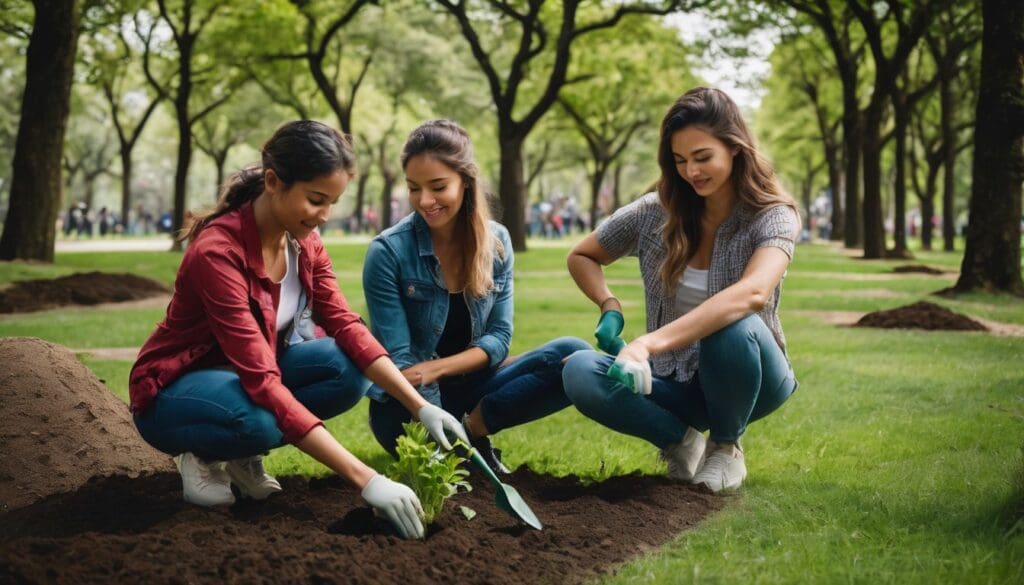Climate change is knocking on our doorsteps, urging communities to take urgent action. Workshops focused on climate action can empower locals to make a real difference. This blog will guide you through organising an effective workshop, from planning to execution and beyond.
Get ready to inspire change!
Key Takeaways
- Engage your local community by using social media, flyers, and word of mouth to spread the word about the climate change action workshop.
- Use the Climate Change Adaptation Workshop Planning Guide for a step-by-step approach to organise your event effectively.
- Involve local government and organisations from the start; their support can provide resources, help with promotion and ensure a wider impact.
- Offer practical materials like The Peoples Climate Movement Discussion Guide and The World’s Largest Lesson to educate attendees on taking action against climate change.
- Encourage participation through interactive activities during the workshop and foster ongoing partnerships for long-term environmental sustainability efforts in your community.
What is a Community Workshop on Climate Change Action?
A Community Workshop on Climate Change Action is a gathering of local residents to discuss the impacts of climate change and devise plans for adaptation and mitigation. The workshop aims to engage the community in understanding climate actions and building resilience against environmental challenges.
Purpose and goals
The purpose of holding a community workshop on climate change action is to empower local individuals with the knowledge and tools needed to address environmental issues directly impacting their lives.
It aims to transform concern into proactive strategies, fostering environmental sustainability at a grassroots level. Goals for such an event include educating participants on the science of climate change, its local effects, and ways to engage in effective climate preparedness planning.
These workshops also serve as platforms for building strong networks amongst environmentally conscious citizens. They encourage collaborative efforts towards creating robust climate action plans that can be implemented within communities.
By bringing together diverse groups, these gatherings aim to develop a unified approach for enhancing climate resilience and advocating for policies that support environmental advocacy and sustainable living practices.
Target audience
Environmentally conscious individuals with a passion for conservation are the ideal audience for this workshop. Those who seek sustainable solutions and are eager to take proactive steps in addressing climate change impacts will find value in participating.
The workshop aims to empower individuals with knowledge and skills, fostering collaboration within local communities to drive meaningful climate action. This event is tailored for those seeking practical ways to address environmental challenges on a local and regional level, promoting grassroots activism and community engagement.
The town meeting offers an opportunity for attendees to openly discuss climate education, adaptation strategies, and mitigation efforts. By bringing together like-minded individuals committed to positive change, the workshop aims to create a space where participants can share experiences, ideas, and goals while building networks that support shared environmental awareness towards collective climate action.
Planning and Organising the Workshop
Utilise the Climate Change Adaptation Workshop Planning Guide to create a structured plan for the workshop. Collaborate with local government and organisations to ensure a wide-reaching impact.
Using the Climate Change Adaptation Workshop Planning Guide
The Climate Change Adaptation Workshop Planning Guide provides a step-by-step framework for organising the workshop. It is a comprehensive resource that covers:
- Identifying local climate impacts and vulnerabilities.
- Engaging community members in the planning process.
- Developing tailored strategies for climate change adaptation.
- Creating an action plan with measurable goals and objectives.
- Evaluating and monitoring the progress of adaptation initiatives.
Collaborating with local government and organisations
To ensure the success of the workshop, local government and organisations must be involved. Engaging with these stakeholders allows for the pooling of resources and expertise in climate change action.
By collaborating with regional bodies, such as environmental agencies or conservation groups, it ensures a diverse range of perspectives and knowledge are brought to the table. This cooperation also demonstrates a united front in addressing climate change to the wider community, fostering a sense of shared responsibility and urgency.
Working hand-in-hand with local government provides access to valuable resources like funding support or venues for hosting workshops. Additionally, establishing partnerships with relevant organisations can lead to more extensive promotion and participation within the community event.
Workshop Materials and Resources
Explore the materials and resources available for organising a successful community workshop on climate change action, including discussion guides from the Peoples Climate Movement and educational resources like The World’s Largest Lesson.
Engage your audience with informative and impactful materials to drive meaningful discussion and action.
The Peoples Climate Movement Discussion Guide
The Peoples Climate Movement Discussion Guide provides a comprehensive framework for engaging local and regional communities in meaningful conversations about climate change mitigation.
This guide offers practical resources to support workshops, town meetings, and educational sessions on climate change adaptation. With a focus on community empowerment and action, the guide encourages individuals to explore feasible, near-term actions that can contribute to broader climate change solutions.
It is an essential tool for fostering dialogue and inspiring collaborative efforts towards building resilient communities in the face of environmental challenges.
The World’s Largest Lesson
The World’s Largest Lesson is a global initiative that provides educational resources for teaching young people about the Sustainable Development Goals, including climate action. Through engaging lesson plans and activities, this resource can be used to educate local communities on the importance of taking action against climate change.
By incorporating these materials into the workshop, participants can gain a deeper understanding of the issues at hand and how they can contribute to positive change in their local and regional environments.
Utilising The World’s Largest Lesson as part of the workshop materials empowers individuals to become advocates for climate change education. By fostering an understanding of the urgent need for environmental conservation and sustainable practices, this resource encourages active participation in addressing climate challenges within local communities.
Other workshop resources and materials
Local and regional climate action workshops can benefit from a range of resources to engage participants and foster productive discussions. Besides the Peoples Climate Movement Discussion Guide, The World’s Largest Lesson resource is also valuable for its interactive educational activities aimed at raising awareness about environmental challenges.
In addition, other useful workshop materials include relevant documentaries, infographics for visual aids, and local case studies highlighting successful community initiatives in climate change action.
These varied resources provide a comprehensive toolkit to educate and inspire individuals towards taking active steps in combating climate change.
To enhance the workshop experience, consider incorporating interactive tools such as online carbon footprint calculators or virtual reality experiences showcasing the impact of climate change on different regions.
Moreover, offering practical take-home materials like reusable shopping bags or seed packets can help reinforce the message of sustainable living and empower attendees to make positive changes in their daily lives.
Engaging the Community
Promoting the workshop through local media, social media, and community channels will help spread awareness and encourage participation. Engaging with local organisations and leaders to rally support for the workshop is key in fostering a sense of community involvement in climate change action.
Promoting the workshop
To engage environmentally conscious individuals and those supporting conservation, promote the workshop through various channels:
- Utilise social media platforms such as Facebook, Twitter, and Instagram to share information about the workshop.
- Create visually appealing flyers and distribute them at local businesses, community centres, and environmental events.
- Reach out to local environmental organisations and ask them to spread the word to their members.
- Collaborate with schools and universities to include information about the workshop in newsletters or on notice boards.
- Host an informational booth at farmers’ markets or other community events to speak directly with interested individuals.
- Utilise email newsletters and mailing lists of local sustainability groups to share details about the workshop.
Encouraging participation
To engage the local community, promote the workshop through social media, flyers, and word of mouth. Create a buzz around the event by sharing captivating visuals and compelling messages that emphasise the importance of individual action in combating climate change.
By making the workshop interactive and inclusive, it will encourage more individuals to participate actively.
Encouraging participation can also be achieved by involving local influencers or leaders in environmental initiatives. Their endorsement of the workshop could inspire others to join in and show their support for local and regional climate action.
Taking Action
Identifying feasible, near-term actions and building partnerships will be key in creating a plan for climate change adaptation within the community. This step will help in translating knowledge and discussion into tangible steps towards environmental sustainability.
Identifying feasible, near-term actions
To identify feasible, near-term actions for climate change action:
- Conduct a community brainstorming session to generate ideas on small – scale, practical initiatives.
- Collaborate with local businesses and organisations to assess opportunities for sustainable practices.
- Organise a survey or focus group to gather input from community members on potential actions.
- Prioritise actions based on their impact, feasibility, and cost – effectiveness.
- Establish partnerships with experts in environmental sustainability and conservation to provide guidance on viable strategies.
- Create an action plan that outlines specific steps, timelines, and responsible parties for each identified initiative.
Building partnerships and creating a plan for climate change adaptation
To address climate change, forming partnerships with local organisations and authorities is crucial. By collaborating, we can combine resources and expertise to create a comprehensive plan for climate change adaptation in our community.
Working together increases the effectiveness of our efforts and encourages a united front against environmental challenges.
Creating a plan for climate change adaptation involves identifying key stakeholders, setting clear objectives, and allocating responsibilities. Engaging with local government agencies, environmental groups, and businesses allows us to pool our knowledge and take practical steps towards safeguarding our environment for future generations.
Conclusion
In conclusion, organising a community workshop on climate change action is an impactful way to engage and empower the public. It provides a platform for individuals to learn about climate change and take meaningful steps towards mitigating its effects.
By collaborating with local organisations and government bodies, these workshops can serve as catalysts for real change within communities. Encouraging active participation and fostering partnerships can help in creating actionable plans for addressing environmental concerns.
FAQs
1. What is the purpose of a community workshop on climate change action?
A community workshop on climate change action aims to educate and engage local people in understanding and addressing the effects of climate change.
2. How can I organise a successful workshop on climate change?
To organise an impactful workshop, plan interactive activities, gather resources, and invite experts who can inspire attendees to take real-world actions against climate change.
3. Who should be invited to attend a community workshop on climate change?
Everyone interested in making a difference—including residents, business owners, educators, and local government representatives—should be invited to join the conversation about taking action on climate change.
4. What outcomes should we aim for with a climate change action workshop?
The goal should be not only raising awareness but also setting up actionable steps that participants can take away to help combat climate change within their own communities.





